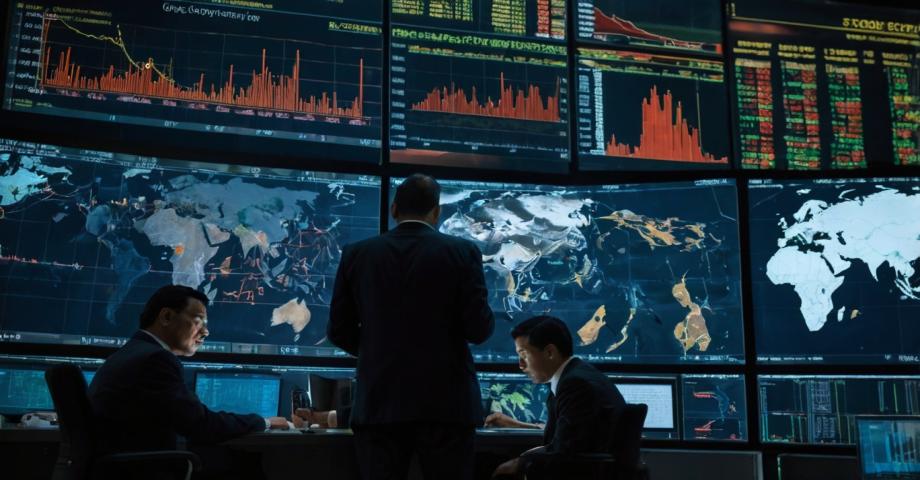




In the complex and interconnected global economy, the influence of geopolitical events on investment trends cannot be underestimated. Over the past few decades, we have seen how political decisions, conflicts, and international relations have the power to shape global financial markets, often with profound consequences for investors and businesses alike. Geopolitical events — including political elections, trade wars, military conflicts, economic sanctions, and diplomatic relations — create both risks and opportunities in the investment world. As the year 2025 unfolds, investors must remain keenly aware of how geopolitical developments will influence their portfolios and the markets as a whole.
Geopolitical risk refers to the political, economic, and social factors that affect the stability and operation of markets and businesses around the world. These risks can arise from changes in government, economic policies, international relations, or even social unrest. Investors must understand how these risks manifest and how they can affect global financial trends. Some key ways in which geopolitical events influence global investments include:
Market Volatility: Geopolitical instability can lead to market volatility, as investors react to the uncertainty of the political landscape. For instance, trade disputes or the imposition of economic sanctions can result in rapid price fluctuations in stock markets, currency exchange rates, and commodity prices.
Shifting Investor Sentiment: Geopolitical developments can significantly influence investor confidence. Positive political developments, such as stable elections or new trade agreements, often boost market sentiment and increase investment flows into certain regions. Conversely, tensions such as military conflicts or diplomatic standoffs can drive investors away from affected regions, leading to capital flight or a shift towards safer investment options.
Changes in Trade and Investment Flows: Geopolitical events directly impact trade routes, investment agreements, and foreign direct investment (FDI). The introduction of tariffs, trade restrictions, and sanctions can force companies to reassess their supply chains and investment strategies, often leading to the redirection of capital to more stable or favorable regions.
Impact on Commodities and Natural Resources: Geopolitical events are particularly influential in sectors like energy and commodities. Conflicts in oil-producing regions or sanctions on resource-rich countries can affect global commodity prices. This can influence investment in energy companies, mining stocks, and other resource-dependent sectors.
In this article, we explore how geopolitical events are shaping investment trends in 2025, highlighting the major developments that are likely to drive market dynamics in the coming years.
One of the most significant geopolitical issues affecting investment trends today is the relationship between the United States and China. Over the past few years, trade tensions, tariffs, and technology bans have escalated, and the two largest economies in the world have become increasingly engaged in a complex economic rivalry. In 2025, the ongoing geopolitical developments between the U.S. and China will have a lasting impact on global investment patterns.
Trade War and Supply Chain Realignments: The trade war between the U.S. and China, which began in 2018, has already had widespread effects on global supply chains and manufacturing. As companies in both countries look to diversify their supply chains to avoid tariffs or potential disruptions, we are likely to see increased investments in alternative manufacturing hubs such as Vietnam, India, and Mexico. Investors are expected to focus on these emerging markets, which offer competitive labor costs and growing consumer demand.
Technology Competition: Another crucial aspect of the U.S.-China geopolitical rivalry is the competition for dominance in technology, particularly in fields like artificial intelligence (AI), 5G networks, and semiconductor manufacturing. As these two superpowers invest heavily in advancing their technological infrastructure, investors in the tech sector will closely monitor these developments. Companies that are closely tied to China, such as those involved in the development of semiconductors or 5G technology, could experience volatility due to shifting geopolitical alliances or regulatory changes.
Investment Shifts and Risk Management: Geopolitical tensions between these two powers also drive investors to consider risk management strategies, such as diversifying their investments across different regions or shifting capital to safe-haven assets like gold, sovereign bonds, and defensive sectors like utilities and healthcare.
While global superpowers like the U.S. and China dominate the geopolitical stage, there is a growing trend toward the rise of regional powerhouses and trade alliances that are shaping investment trends in new ways. In 2025, the emergence of new economic zones and trade blocs will have significant implications for global markets.
European Union (EU): The EU continues to maintain its position as a major economic bloc. However, its unity has been tested by challenges such as Brexit and populist movements. As the EU works toward further economic integration and responds to external geopolitical pressures, such as Russian influence in Eastern Europe, investors will closely monitor the EU’s economic policies, regulatory changes, and trade agreements.
ASEAN and Regional Integration: The Association of Southeast Asian Nations (ASEAN), a growing economic bloc in Asia, is becoming increasingly important as a counterbalance to China’s dominance in the region. As countries like Indonesia, Thailand, and Vietnam continue to grow economically, ASEAN’s push for greater integration could lead to new investment opportunities, especially in infrastructure, technology, and consumer markets.
African Continental Free Trade Area (AfCFTA): Africa’s new continental trade area, the AfCFTA, promises to reshape the investment landscape by reducing tariffs and boosting intra-African trade. This agreement could attract significant investment into African economies, particularly in industries like energy, agriculture, and infrastructure development.
In 2025, political instability in regions such as the Middle East, Latin America, and Eastern Europe will continue to affect investment strategies. Political uncertainty and the imposition of economic sanctions can have profound effects on the global economy.
Sanctions and Economic Isolation: Countries like Iran, North Korea, and Venezuela will remain under international sanctions, which could deter investment in these regions. However, these countries may also turn to regional partners or China for alternative trade and investment avenues. Investors will need to carefully weigh the risks of investing in regions subject to economic isolation.
Instability in the Middle East: The Middle East has long been a hotspot for geopolitical volatility, with conflicts such as the Syrian civil war and tensions between Iran and Saudi Arabia creating instability. These tensions have a direct impact on energy prices, making the region a crucial area for investment in commodities. The volatility in oil prices due to geopolitical tensions in this region will continue to shape global investment trends, particularly in the energy and commodities markets.
Environmental issues are increasingly becoming a central focus of geopolitical discussions. In 2025, climate change and sustainable investment will shape global markets as governments and corporations are forced to act in response to mounting pressure from environmental activists and international organizations.
Green Energy Initiatives: With the Paris Agreement and other climate accords in place, countries are adopting policies that promote renewable energy, electric vehicles, and low-carbon technologies. This shift will drive investment in green energy solutions, creating new opportunities in solar, wind, hydrogen, and electric vehicle markets. Governments' political support for clean energy is shaping the trajectory of investments into sustainable industries.
Carbon Trading and Environmental Regulations: In response to growing concerns over carbon emissions, we expect to see the expansion of carbon markets and emissions trading systems. This geopolitical shift will influence how companies allocate capital and develop new technologies to comply with stricter environmental regulations.
The complex and often unpredictable nature of geopolitical events means that investors must adopt a dynamic and flexible approach to managing their portfolios. As 2025 unfolds, understanding how geopolitical developments influence global investment trends will be crucial for identifying risks and seizing opportunities. By staying informed about the shifting political landscape and adjusting investment strategies accordingly, investors can position themselves to thrive in a world where geopolitical forces have an undeniable impact on markets.